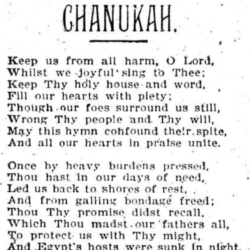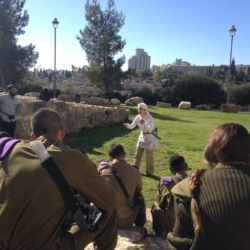| Hebrew (source, adapted) | Transliteration (romanization) | Translation (English) |
|---|---|---|
מָעוֹז צוּר יְשׁוּעָתִי לְךָ נָאֶה לְשַׁבֵּֽחַ תִּכּוֹן בֵּית תְּפִלָּתִי וְשָׁם תּוֹדָה נְזַבֵּֽחַ לְעֵת תָּשְׁבִּית מַטְבֵּֽחַ וְצָּר הִמְּנַבֵּֽחַ אָז אֶגְמֹר בְּשִׁיר מִזְמוֹר חֲנֻכַּת הַמִּזְבֵּֽחַ׃ |
Maˈoz tsur yeshuˈati lekha naˈeh leshabbeaḥ tikkon bet tefillati vesham toda nezabbeaḥ leˈet tashbit matbeaḥ vtsar himmnabbeaḥ az egmor beshir mizmor ḥanukkat hammizbeaḥ |
Mighty, praised beyond compare, Rock of my salvation, Build again my House of Pray’r For thy habitation! Haste my restoration: let a ransomed nation[1] The literal translation of lines two and three is: “when Thou shalt have utterly destroyed the blaspheming foe, I will complete with song and psalm the dedication of the altar” [לעת תכין מטבח. מצר המנבח]. By a slight change, this is now: “when Thou shalt cause all slaughter to cease, and the blaspheming foe, I will complete, etc” [לעת תשבית מטבח. וצר המנבח]. Joyful sing To its King Psalms of dedication! |
רָעוֹת שָׂבְעָה נַפְשִׁי בְּיָגוֹן כֹּחִי כָלָה חַיַּי מֵרֲרוּ בְקֽוּשִׁי בְּשִׁעְבּוּד מַלְכוּת עֶגְלָה וּבְיָדוֹ הַגְּדוֹלָה הוֹצִיא אֶת הַסְּגֻלָּה חֵיל פַּרְעֹה וְכׇל־זַרְעוֹ יָרְדוּ כְּאֶֽבֶן מְצוּלָה׃ |
Raˈot saveˈa nafshi beyagon koḥi khala ḥayyay meraru vekushi beshiˈbud malkhut egla uvyado haggedola hotsiˈ et hassegulla ḥel parˈoh vekhol-zarˈo yardu keˈeven metsula |
Woe was mine in Egypt-land Tyrant kings enslaved me, Till Thy mighty, outstretched Hand From oppression saved me. Pharaoh, rash pursuing, vowed my swift undoing; Soon, his host That proud boast ‘Neath the waves was rueing! |
דְּבִיר קׇדְשׁוֹ הֱבִיאַֽנִי וְגַם שָׁם לֹא שָׁקַֽטְתִּי וּבָא נוֹגֵשׂ וְהִגְלַֽנִי כִּי זָרִים עָבַֽדְתִּי וְיֵין רַֽעַל מָסַֽכְתִּי כִּמְעַט שֶׁעָבַֽרְתִּי קֵץ בָּבֶל זְרֻבָּבֶל לְקֵץ שִׁבְעִים נוֹשָֽׁעְתִּי׃ |
Devir kodsho heviˈani vegam sham lo shakatti uva noges vehiglani ki zarim avadeti veyein raˈal masakhti kimˈat sheˈavarti keits bavel zerubbavel lekeits shivˈim noshaˈeti |
To thy holy Hill, the way Mad’st Thou clear before me; With false gods I went astray— Foes to Exile bore me. Torn from all I cherished, almost had I perished; Babylon fell, Zerubabel Had’st Thou to restore me! |
כְּרוֹת קוֹמַת בְּרוֹשׁ בִּקֵּשׁ אֲגָגִי בֶּן־הַמְּדָֽתָא וְנִהְיָֽתָה לּוֹ לְמוֹקֵשׁ וְגַאֲוָתוֹ נִשְׁבָּֽתָה רֹאשׁ יְמִינִי נִשֵּֽׂאתָ וְאוֹיֵב שְׁמוֹ מָחִֽיתָ רֹב בָּנָיו וְקִנְיָנָיו עַל הָעֵץ תָּלִֽיתָ׃ |
Kerot komat berosh bikkesh Agagi ben-Hammedata venihyata lo lemokesh vegaˈavato nishbata roˈsh yemini nisseˈta veˈoyev shemo maḥita rov banav vekinyanav al haˈets talita |
Then the vengeful Haman wrought Subtly to betray me; In his snare himself he caught— He that planned to slay me. (Haled from Esther’s palace, hanged on his own gallows!) Seal and ring Persia’s king Gave Thy servant zealous. |
יְוָנִים נִקְבְּצוּ עָלַי אֲזַי בִּימֵי חַשְׁמַנִּים וּפָרְצוּ חוֹמוֹת מִגְדָּלַי וְטִמְּאוּ כׇּל הַשְּׁמָנִים וּמִנּוֹתַר קַנְקַנִּים נַעֲשָׂה נֵס לַשּׁוֹשַׁנִּים בְּנֵי בִינָה יְמֵי שְׁמוֹנָה קָבְעוּ שִׁיר וּרְנָנִים׃ |
Yevanim nikbetsu alay azai bimei ḥashmannim ufaretsu ḥomot migdalay vetimmeˈu kol hashemanim uminnotar kankannim naˈasa nes lashoshannim benei vina yemei shmona kavˈu shir urnanim |
When the brave Asmoneans broke Javan’s chain in sunder, Through the holy oil, Thy folk Didst Thou show a wonder. Ever full remained the vessel unprofaned: These eight days, Lights and praise Therefore, were ordained. |
Rabbi David Seidenberg (neohasid.org) forwards a teaching related by a Rabbi H.D. Uriel Smith, “For several years I have sung Ma’oz Tsur using the variation Rabbi Dr. Joseph H. Hertz made to the first stanza of the hymn. Instead of לעת תכין מטבח. מצר המנבח “l’et takhin matbe-ah, mitzar ha-m’nabe-ah” (“When you have prepared a massacre of the barking foe”), he wrote לעת תשבית מטבח. וצר המנבח “l’et tashbit matbe-ah, v’-tzar ha-m’nabe-ah” (“When you have stopped any massacre and any barking foe”). Adapted text in GREEN above.
Since it has been seventy years since the death of Rabbi Hertz (1872-1946), the copyright on the initial editions to whom the copyright notice was assigned, has expired and the work resides in the Public Domain.
Source

Notes
| 1 | The literal translation of lines two and three is: “when Thou shalt have utterly destroyed the blaspheming foe, I will complete with song and psalm the dedication of the altar” [לעת תכין מטבח. מצר המנבח]. By a slight change, this is now: “when Thou shalt cause all slaughter to cease, and the blaspheming foe, I will complete, etc” [לעת תשבית מטבח. וצר המנבח]. |
|---|

“מָעוֹז צוּר | Maoz Tsur, attributed to Mordecai ben Yitsḥak haLevi (adapted by R’ Joseph H. Hertz, trans. by Solomon Solis-Cohen)” is shared through the Open Siddur Project with a Creative Commons Attribution-ShareAlike 4.0 International copyleft license.










A bit cleaned-up! Even in the politest Rabbi Sacks version, we have Haman and his many sons and his household all hanged on the gallows.